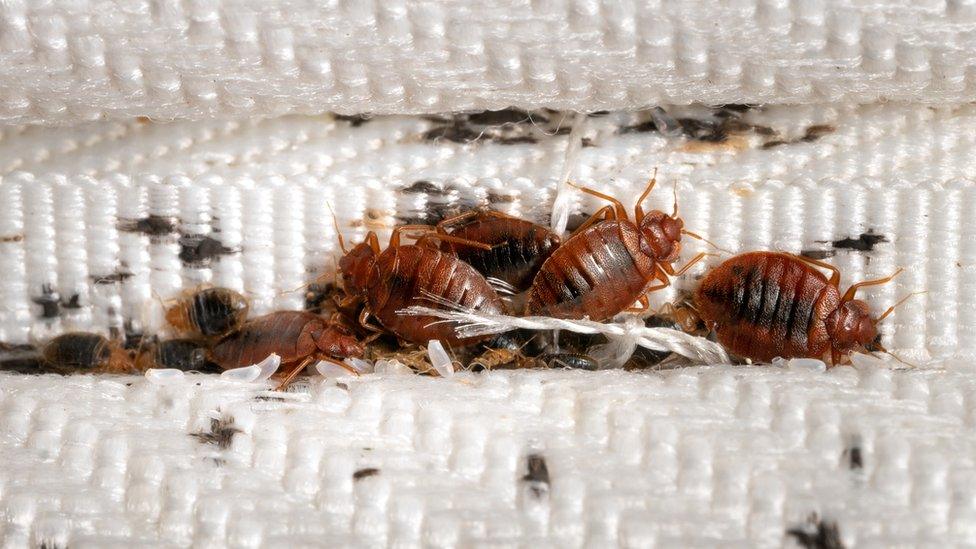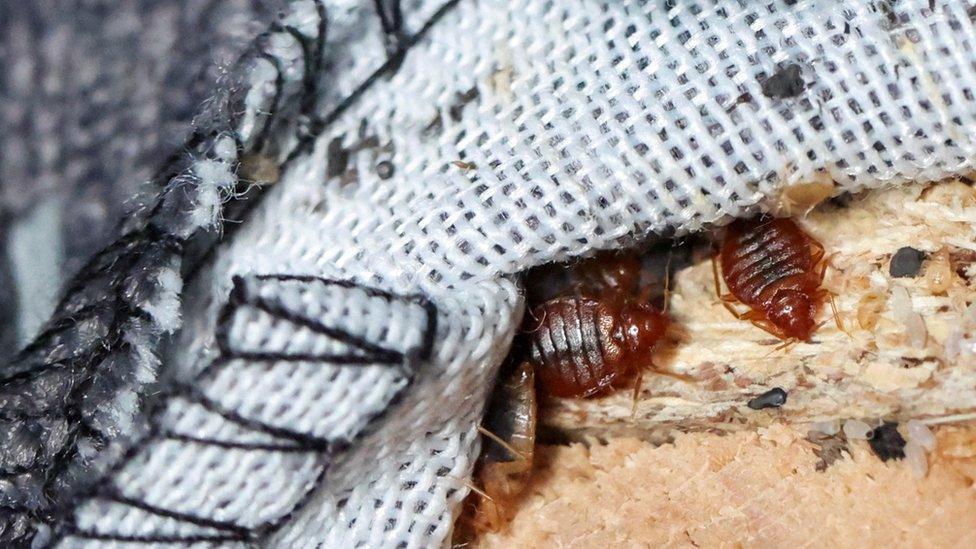How to get rid of bedbugs and are they in the UK?
- Published
Watch: BBC correspondent Hugh Schofield goes on the hunt for Paris bedbugs
Panic is said to be sweeping Paris and other French cities as infestations of bedbugs have apparently soared in recent weeks. While experts say the upward trend goes back several years, some are getting jittery about bugs in the UK too.
Here we answer some of the key questions people may have.
What do bedbugs look like?
Bedbugs are small, with adults reaching about 5mm in length (less than a grain of rice) and are oval-shaped. They have six legs and can be dark yellow, red or brown.
There are about 90 species worldwide, although the common bedbug (cimex lectularius) has adapted the best to human environments, according to the British Pest Control Association.
The term "bedbug" can be a touch misleading. As well as mattresses, they can also be found on clothing, furniture, bed frames, or behind loose wallpaper.
How do I know if I've got bedbugs?
Bites are the main thing to look out for, and they are usually raised and itchy, external. Bedbug bites are often in a line or grouped together.
On white skin the bites usually look red, while on black or brown skin they could be purple and harder to see.
Other things to look out for are spots of blood on bedding - if the bugs have been squashed - or small brown spots on bedding or furniture, which could be their faeces.
Natalie Bungay, from the British Pest Control Association, said that if travelling, checking for the insects was crucial and that "prevention is always better than cure".
"If you feel you're in an area that's got a bit of an outbreak, as they're reporting in the news, then the best thing to do is just check all your items - they may travel in suitcases," she told the BBC.
"Check any luggage that you may have put in the room because a lot of the time we put our suitcases or bags on the bed."
How do you treat bedbug bites?
Although often uncomfortable, bedbug bites are not typically dangerous.
They can be very itchy, and there may be some painful swelling, but they usually clear up on their own in about a week - or they can be treated with some basic measures.
These include:
Putting something cool, like a damp cloth, on the area
Keeping the affected area clean
And do avoid scratching the bites
Antihistamines can help if bites are very itchy, while a mild steroid cream like hydrocortisone might be useful.
A severe allergic reaction, known as anaphylaxis, external, is possible but rare.
A GP appointment should be sought if the bites remain painful, swollen or itchy after trying treatments from a pharmacist, or if the pain or swelling around the bites is spreading.

Bedbug bites can be itchy, but usually disappear on their own
How to get rid of bedbugs
It can be difficult but there are steps that can be taken, including:
Washing contaminated bedding and clothing on a hot wash and tumble dry on a hot setting for at least 30 minutes
Put the clothing or bedding in a plastic bag and put in the freezer for three or four days
Clean the house regularly - bed bugs can be found in both clean and dirty places, but regular cleaning can help to spot them
Other steps include avoiding cluttering around beds, or checking second hand furniture before taking it indoors.
Ms Bungay, from BCPA, said it was important not to be ashamed of having bedbugs in the home and to call in an expert pest controller, describing them as a "public health pest", although mainly in a psychological capacity.
"They're not proven to transmit disease, but it's the psychological effect that they have on someone when you've got them in your home," she said.
"They feed from our blood, they just like us."
Is this problem anything new in the UK?
In short - no.
Bedbugs have been an issue in the UK for many years and are a "public health pest that is notoriously difficult to treat", said Ms Bungay.
They can be found all over the UK, but are a bigger issue in major cities.
Ms Bungay said her organisation was not aware of any unusual increase in bedbug activity.
"There was a dip during Covid-19 due to the lack of global travel taking place, so any increase now could just be trends getting back to normal now that everybody is moving freely again," she said.
She added that seasonal increases in numbers, particularly as more people travel during the summer months, was nothing unusual.
"It's also worth remembering that not every call out for bedbugs will result in a positive identification of the pest - increased media attention or public awareness can often lead to false alarms."
Related topics
- Published3 October 2023

- Published12 September 2023
